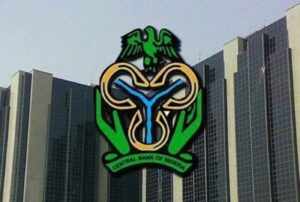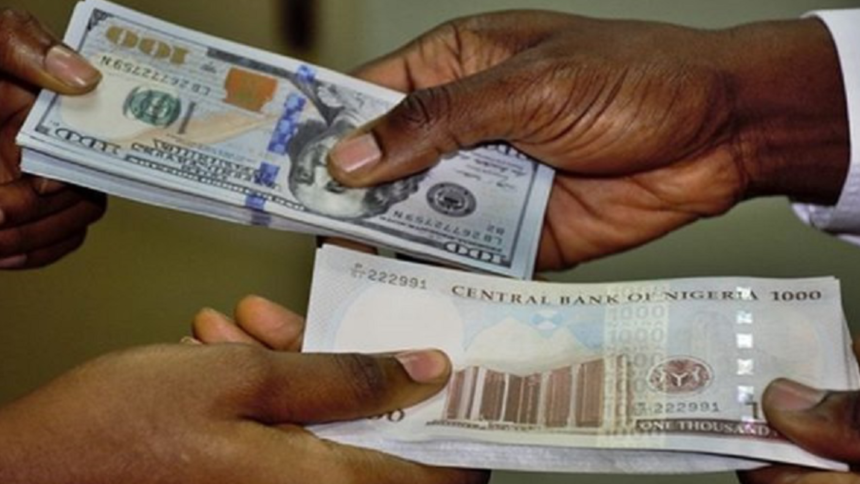Offloading of dollars by traders in response to the Central Bank of Nigeria’s (CBN) new foreign exchange framework is giving the naira a mileage that has seen the local currency appreciate considerably across segments in the last trading days.
It is widely expected that the fear that the situation may continue in the coming weeks could trigger more panic selling that may push the naira even higher.
While official market experienced rapid gains in the exchange rate, the parallel market offers even more unsettling scenario for speculators, with the naira gaining faster than they could sell. …CONTINUE READING


By the end of the week, operators informed Business Hallmark that the exchange rate was trading at N1,570/$1, a sharp decline from N1,700/$1 earlier in the week, as the naira continued its strong recovery against the dollar.
The CBN had on Monday, December 2, launch the Electronic Foreign Exchange Matching System (EFEMS), an electronic platform introduced to tackle speculation and improve transparency in Nigeria’s foreign exchange market.
In a circular announcing the EFEMS platform, the apex bank explained that it facilitates spot foreign exchange transactions between the naira and the U.S. dollar. The platform, operated through Bloomberg’s BMatch system, requires a minimum trade value of $100,000, with incremental trade sizes of $50,000.
CBN also stated that the platform automatically matches buy and sell orders, promoting fairness and efficiency in FX trading. The EFEMS system allows authorized dealers, including commercial banks, to place buy and sell orders in real-time. Transactions are automatically matched based on predetermined rules, ensuring swift execution and real-time visibility for market participants and regulators.
Speaking at the Chartered Institute of Bankers (CIBN) 59th annual bankers’ dinner in Lagos, recently, Governor of CBN, Olayemi Cardoso, described EFEMS as a transformative step towards market transparency and price discovery.
He said, “The unification of the exchange rate is a pivotal reform, but it marks just the beginning. On the 2nd of December 2024, the foreign exchange market will begin trading on the electronic FX matching system to further enhance transparency, restore confidence, and attract new investments.
“Coupled with an improved framework for deploying products targeting the Nigerian diaspora and efforts to establish a well-functioning FX market, we anticipate increased diaspora and foreign investments over the next 12 months, building a more resilient and liquid FX market.”
Cardoso said over the past year, CBN had undertaken critical reforms to unify Nigeria’s exchange rate, eliminating distortions and restoring transparency. He also addressed misconceptions about the FX market, emphasizing the role of EFEMS in countering panic-driven distortions.
He said, “It is vital to address the disinformation circulating about a supposed demand-supply gap in the FX market, which is fuelling unnecessary panic.
“The current USD exchange rate reflects the price that the most desperate buyers are willing to pay, and this does not represent the true market value of the naira.
“The introduction of the electronic matching system will correct these distortions by enhancing the price discovery process. Additionally, it will significantly boost the central bank’s oversight and intervention capabilities, ensuring a more stable and transparent foreign exchange market.”
Speedy rebound
Little wonder the move has propelled the naira to significant gains, with rates strengthening to N1,587.29 to the dollar in the official market, and N1,640 at the parallel market.
The currency, which had depreciated to a record low of N1,755 per dollar on November 21, 2024, prior to the implementation of the new FX policy, has since recovered by 18.8 percent, or N240, to its current rate of N1,640 in the black market.
At the official market, the naira also recorded gains, appreciating by 2.08 percent, or N32, as the dollar was quoted at N1,535 on Friday compared to Thursday’s closing rate of N1,567 at the Nigerian Foreign Exchange Market (NFEM), according to CBN data.
A breakdown of the movements at the parallel market last week showed that it began registering gains on Tuesday, trading at N1,720/$1 from a stagnant rate of N1,745/$1, which had persisted for over a month. On Wednesday, the naira appreciated sharply to N1,670/$1and further strengthened to N1,640/$1 on Thursday.
On the official market, CBN quotes for the NFEM showed the average rates starting at N1,662.77 on Monday, improving to N1,644.78 on Tuesday, and further to N1,613.86 on Wednesday, before hitting N1,587.29 on Thursday.
Cautious optimism
Some financial experts have expressed optimism about EFEMS’ potential to address persistent challenges affecting the naira and Nigeria’s FX reserves.
Others, however, expressed reservations, saying while the fact that Dangote Refinery has started supplying product to oil marketers as well as the EFEMS may have marginally impacted the exchange rate to the advantage of the naira, the present surge in dollar liquidity is traceable more to the Yuletide, which makes it unsustainable.
Head of Financial institutions Ratings at Agusto &Co, Ayokunle Olubunmi, sees the new platform as a significant step forward, emphasizing its potential to unite key market participants while ensuring that transactions are conducted with transparency.
“What EFEMS has done is that it is automatically redefining the market. It’s a way of sanitizing the FX market. All the major players, including the BDC guys, who are serious and know what they’re doing, can participate in this market. It’s also about digitizing the system. Prices will be transparent”, Olubunmi.
Chief Executive Officer, CFG Advisory, Tilewa Adebajo, lauded the new initiative, but thinks it is too early to attribute the significant naira appreciation to it.
“The new foreign exchange matching system is a welcome development for price discovery to try and put some sophistication in our markets and remove discrepancies”, Adebajo said.
“The whole essence of how naira is appreciated, I think it’s too early to attribute it to this new system. So, let’s see how it turns out. But I think transparency in any market is very important and it is a very important step towards that kind of transparency.”
Findings showed that the market is witnessing serious panic selling, especially by speculators, who had hoarded dollars for months in anticipation of continuous depreciation of the naira.
Traders, who spoke to Business Hallmark anonymously, suggested that many of their suppliers are in a hurry to sell, as no one wanted to hold on to a currency rapidly losing value against the naira.
Our correspondent reliably gathered that the suppliers even sold at rates as low as N1,500 per dollar on the parallel market, a rate much lower than what is obtainable on the official market.
-Business day




